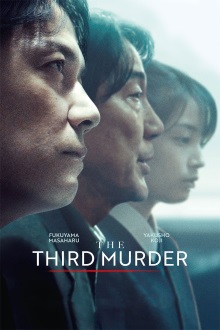
Next we have yet another Japanese film by Hirokazu Kore-eda. The director seems to be on a roll as he is making noteworthy films every year. This one is unlike the others as it is a legal thriller and not a family drama. Yet somehow the director can’t resist filling it with flawed parental figures as well.
Tomoaki Shigemori is brought in as a defense lawyer for a man, Misumi, who has been accused of murdering his employer. Misumi doesn’t deny committing the crime but his previous lawyer has grown frustrated that he keeps changing his account of what happened. The case is also complicated by the fact that Misumi had been previously been convicted of a double murder and he had spent 30 years in prison for it. Coincidentally, the judge who sentenced him back then is Shigemori’s father. Instead of pleading not guilty, Shigemori pursues a legal strategy of trying to avoid the death penalty by claiming that the killing was not done with the intent of robbing the victim as alleged by the prosecution. But then Misumi surprises everyone by claiming that the victim’s wife paid him to commit the murder in order to get the insurance money. Shigemori also becomes suspicious when he realizes that the victim’s daughter is friendly with Misumi.
I read that the director had no particular expertise in legal matters and so did extensive research for this film. Still, some aspects of the film remain puzzling to me. For example, I don’t understand who engaged Shigemori to be Misumi’s lawyer as he himself plainly does not possess the resources to do so. If he is meant to be some sort of public defender then he is surprisingly dedicated to the job which rather counteracts the film’s overall theme as a critique of Japan’s legal system. The argument is that the actual truth doesn’t matter and both the prosecution and the defense lawyers cooperate to create a narrative that is acceptable to the all powerful judge. Unfortunately the film is weak at making its point and the fact that Misumi is a previously convicted murderer further muddies the waters. In fact, it’s hard to see why Kore-eda wrote this into the character’s backstory except that it allows him to employ an intriguing title.
At least the acting is good and the film oozes with atmosphere. With a murder at its core, this is the weightiest of Kore-eda’s films yet. Yet it never really coalesces into a satisfying whole. There are interesting bits and pieces, Shigemori’s neglect of his own daughter mirroring Misumi, how his cynicism contrasts with the idealism of his junior colleague, how adults hide wrongdoing and so on, but the individual elements feel too disparate. The big twist in the film is telegraphed and not really interesting. Plus as usual I dislike the mysticism in implying that Misumi has some sort of ability to read minds.
I’ve read before about how the Japanese legal system is more interested in order than justice and it is surely a rich subject matter to be explored on film. However The Third Murder is a half-hearted critique that lacks any real fire, making it only a mediocre film.
One thought on “The Third Murder (2017)”